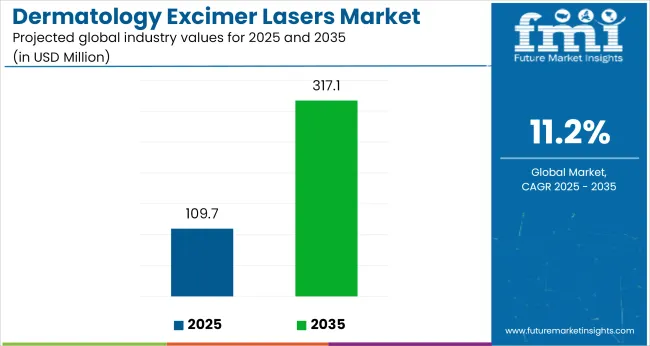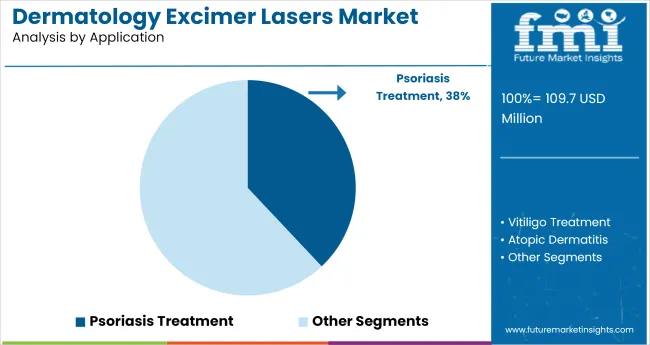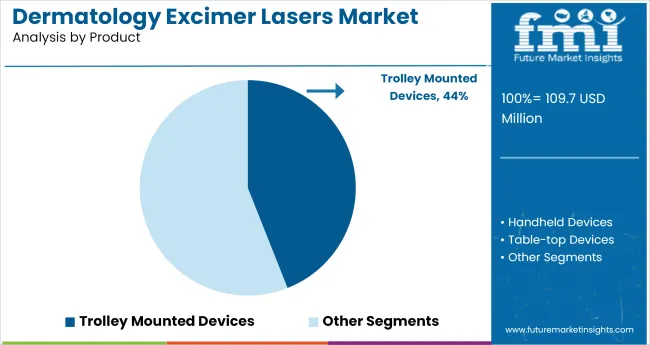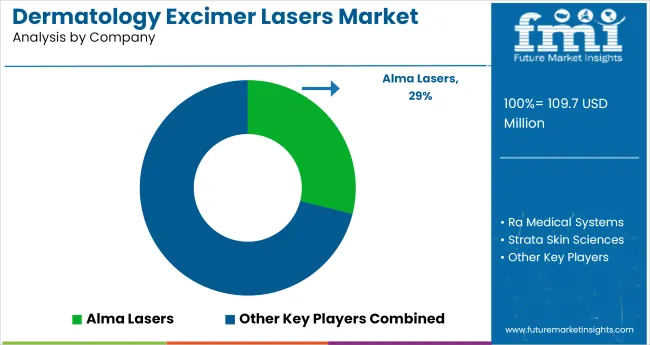The global Dermatology Excimer Lasers Market is estimated to be valued at USD 109.7 million in 2025 and is projected to reach USD 317.1 million by 2035, registering a compound annual growth rate of 11.2% over the forecast period.

| Metric | Value |
|---|---|
| Market Size in 2025 | USD 109.7 Million |
| Projected Market Size in 2035 | USD 317.1 Million |
| CAGR (2025 to 2035) | 11.2% |
The dermatology excimer lasers market is witnessing strong momentum due to rising incidences of chronic skin conditions like psoriasis and vitiligo. These lasers offer high precision and localized treatment with minimal damage to surrounding tissues, making them a preferred choice among dermatologists. Technological advancements, including compact devices and AI integration, are enhancing treatment accuracy and accessibility.
Healthcare systems are embracing these devices for their clinical effectiveness and reduced side effects. Additionally, growing awareness of non-invasive therapies, increasing dermatology clinic networks, and supportive healthcare infrastructure in emerging regions are opening new avenues. With continued innovation and expanding therapeutic demand, the market is positioned for sustained long-term growth driven by evolving patient needs and provider adoption.

Psoriasis Treatment held approximately 38.0% of the global dermatology excimer lasers market revenue share in 2025. The dominance of psoriasis treatment in the excimer lasers market has been attributed to the increasing prevalence of chronic plaque psoriasis globally.
A significant portion of patients has been reported to be non-responsive to topical therapies or systemic drugs, which has created demand for targeted phototherapy options such as excimer lasers. The 308 nm wavelength emitted by these devices has been clinically validated for its superior ability to clear psoriatic lesions with fewer treatment sessions.
Furthermore, it has been widely acknowledged that excimer lasers offer localized precision with minimal side effects, making them an attractive alternative. Recommendations from dermatological societies and inclusion in treatment algorithms have reinforced clinical adoption. Strong endorsements in peer-reviewed journals and inclusion in payer policies have further supported market uptake.

Trolley-Mounted Devices accounted for nearly 44.0% of the total revenue share in the dermatology excimer lasers market in 2025. The trolley-mounted excimer laser segment has held the largest market share owing to its suitability for high-volume dermatology practices.
These devices have been favored by clinicians due to their built-in cooling systems, adjustable spot sizes, and enhanced safety features, all of which contribute to improved treatment precision. The larger platform allows for integration of digital displays and ergonomic controls, which has increased procedural efficiency in busy clinical settings.
Additionally, these systems have been associated with longer device lifespan and reduced maintenance, making them cost-effective over time. It has also been observed that hospitals and specialty clinics tend to prefer stationary, high-capacity systems for treating multiple indications. The high reliability and better energy output stability of trolley-mounted units have made them the preferred choice for treating chronic conditions such as psoriasis and vitiligo.
Dermatology Clinics contributed around 50.2% to the overall dermatology excimer lasers market revenue in 2025. Specialty dermatology clinics have emerged as the primary end users of excimer laser systems due to the growing demand for focused, outpatient-based dermatological treatments.
These clinics have been strategically positioned to adopt advanced technologies, with streamlined workflows that allow for high patient turnover and personalized care. The ability to offer precision treatment with minimal downtime has aligned with patient preferences for non-invasive therapies.
Dermatologists in such settings are more likely to be trained in the latest protocols, increasing confidence in excimer laser applications. Furthermore, clinics have been proactive in investing in devices that improve patient satisfaction and treatment outcomes. A shift in reimbursement policies in favor of outpatient procedures has also incentivized private and specialized clinics to expand their service offerings.
High equipment cost, limited skilled operators, and variable efficacy by skin type
Excimer laser systems are rather costly and therefore limit adoption in small dermatology clinics and developing regions. It is also worth mentioning that limited regard in training and skills to operate treatment procedures safely and effectively can be a deterrent. In addition, variable efficacy of lasers may be experienced across skin types and different stages of the disease, leading to variable outcomes of treatments.
WHO considers that equitable access to advanced dermatological therapies is an important step to bridging disparities in skin health across global populations.
Portable device innovation, expanding aesthetic applications, and personalized therapy
At present, the situation is bright for developing small efficient inexpensive excimer laser units for phototherapy at outpatient and at-home sites. There is an increase in the realm of aesthetic dermatology, such as lasers for stretch marks, scars, and de-pigmentation. Such markets would then come to be counted not as confined in benefit to where disease is identified and treated clinically.
The newest trends are AI-assisted treatment plans, personalized dosing protocols, and interfacing with digital platforms for dermatology. As per WHO, personalized, possibly patient-centered, approaches in skin therapy supplement device-based interventions to enhance the quality of care.
The USA dermatology excimer lasers market is soaring with the rising demand for targeted treatment in chronic skin disorders such as psoriasis, vitiligo, and atopic dermatitis. Dermatology clinics and cosmetic centers are rapidly adopting excimer laser systems to provide precise treatment of localized lesions with minimal impact on the surrounding tissue.
As OECD is aiming to raise awareness of non-invasive dermatological procedures and raise reimbursement for chronic skin disease management, it is expected to widen adoption. It has enabled technological innovations in handheld and high-frequency excimer systems.
| Country | CAGR (2025 to 2035) |
|---|---|
| United States | 11.5% |
The dermatology excimer lasers market in UK is on the rise since phototherapy-based treatment and minimally invasive skin solutions are gaining more preference. NHS along with private dermatology clinics is adopting excimer lasers for precision targeted therapy in autoimmune and pigmentary disorders.
Increased investment was reported by OECD in outpatient dermatology and skin cancer treatment centers, which boost demand. Further driving adoption of laser-based therapies are trainings and public awareness initiatives on psoriasis and vitiligo management.
| Country | CAGR (2025 to 2035) |
|---|---|
| United Kingdom | 11.0% |
The EU market is moving at a good pace as dermatology wings across Germany, France, and the Netherlands are getting excimer lasers to minimize systemic treatments and improve outcome in localized dermatoses. Per UN, EU health systems are prioritizing non-invasive dermatological therapies when it comes to chronic illnesses via public health programs and insurance-supported care.
Development in cosmetic dermatological and outpatient phototherapy solutions has contributed to increased usage of compact, mobile excimer laser systems designed for clinical versatility.
| Country | CAGR (2025 to 2035) |
|---|---|
| European Union | 11.2% |
People in Japan are showing increased interest in the precision-targeted treatment of skin diseases and are getting older-phototype patients. The OECD states that Japan's healthcare support includes non-invasive dermatological procedures, which would explain why excimer lasers are being more commonly used in specialty hospitals for these cosmetic dermatologic clinics.
Local manufacturers are developing compact and easy excimer systems with adjustable wavelengths for safer and improved effective therapies for patients. There is the growing concern of aesthetic skin care, which directly influences the level of adoption.
| Country | CAGR (2025 to 2035) |
|---|---|
| Japan | 10.8% |
Increasing fast in South Korea endoscopy excimer laser market due to the high demand for cosmetic dermatological and the advanced treatment of chronic skin diseases. Integration of excimer laser into psoriasis, vitiligo, and pigmentation correction protocols by dermatology clinics.
According to the OECD, South Korea is dominating the aesthetic innovations and medical device technologies thus rapidly developing compact yet high performance excimer systems. Skin wellness and aesthetics provide further impetus to the general adoption of the procedures in urban and premium care clinics.
| Country | CAGR (2025 to 2035) |
|---|---|
| South Korea | 11.4% |

The dermatology excimer lasers market is witnessing intensifying competition as manufacturers prioritize innovation, clinical efficacy, and user-friendly features. Companies are focusing on refining laser precision, enhancing device portability, and integrating AI-driven enhancements to meet evolving dermatological needs.
Efforts are underway to expand regulatory clearances and reimbursement policies, allowing deeper market penetration across specialty clinics. Competitive differentiation is increasingly driven by clinician engagement programs, digital monitoring platforms, and value-based care alignment. As demand grows for non-invasive, high-precision treatments, players are strategically investing in product upgrades, regional expansion, and real-time treatment documentation tools.
Key Development
The overall market size for the dermatology excimer lasers market was approximately USD 109.7 million in 2025.
The dermatology excimer lasers market is expected to reach approximately USD 317.1 million by 2035.
The demand for dermatology excimer lasers is rising due to the increasing prevalence of skin conditions such as psoriasis, vitiligo, atopic dermatitis, and eczema.
The top 5 countries driving the development of the dermatology excimer lasers market are the United States, Germany, France, Japan, and the United Kingdom.
Trolley-mounted excimer lasers and 308 nm UVB light applications are expected to command significant shares over the assessment period.






Full Research Suite comprises of:
Market outlook & trends analysis
Interviews & case studies
Strategic recommendations
Vendor profiles & capabilities analysis
5-year forecasts
8 regions and 60+ country-level data splits
Market segment data splits
12 months of continuous data updates
DELIVERED AS:
PDF EXCEL ONLINE
Dermatology CRO Market Size and Share Forecast Outlook 2025 to 2035
The dermatology cryosurgery units market is segmented by product, and end user from 2025 to 2035
Dermatology Devices Market is segmented by product type, application, end user & region from 2025 to 2035
Dermatology Lasers Market - Demand, Innovations & Forecast 2025 to 2035
Teledermatology Market Size and Share Forecast Outlook 2025 to 2035
Homecare Dermatology Energy-based Devices Market Growth – Trends & Forecast 2018-2028
Veterinary Dermatology Market Forecast Outlook 2025 to 2035
Excimer and Femtosecond Ophthalmic Lasers Market Size and Share Forecast Outlook 2025 to 2035
Dental Lasers Market Growth – Industry Insights & Forecast 2024-2034
Urology Lasers Market Size and Share Forecast Outlook 2025 to 2035
Cosmetic Lasers Market
Surgical Lasers Market
Ultrafast Lasers Market Analysis - Industry Growth & Forecast 2025 to 2035
Veterinary Lasers Market Size and Share Forecast Outlook 2025 to 2035
Ophthalmic Lasers Market Analysis - Innovations & Forecast 2024 to 2034
Solid State Lasers Market Analysis - Growth & Forecast 2025 to 2035
Pulmonology Lasers Market
Mid-infrared Lasers Market Analysis - Growth & Trends 2025 to 2035
Semiconductor Lasers Market Insights – Trends, Growth & Forecast 2025 to 2035
Carbon Dioxide Lasers Market Size and Share Forecast Outlook 2025 to 2035

Thank you!
You will receive an email from our Business Development Manager. Please be sure to check your SPAM/JUNK folder too.
Chat With
MaRIA